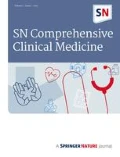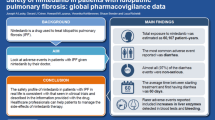Abstract
In this letter, we discuss the potential interactions of remdesivir, the newly approved Covid-19 drug with pulmonary medications. These interactions have been summarized keeping the busy clinician in mind. While remdesivir has proven to be a safe medication generally, we here have enlisted the potential interactions of remdesivir that a clinician needs to be mindful of while prescribing the medication.
Similar content being viewed by others
For coronavirus, there are various therapeutic regimens under trial. Remdesivir has shown promise in initial studies for treating COVID-19 [1]. The mechanism of action for remdesivir has been studied in vivo and in vitro [1]. It acts by delaying the chain termination of RNA synthesis through competing with ATP for incorporation [1]. It has been studied mainly for the Ebola virus and respiratory syncytial virus, but the broad mechanism of action can be helpful in the treatment for SARS-CoV2 [1]. With the use of precision medicine, we can prevent, mitigate, and provide personalized pharmacologic treatment to the patients [2, 3].
Remdesivir is a substrate of CYP 3A4, CYP 2D6, and CYP 2C8, and its metabolism is mediated by hydrolase activity [4, 5]. The potential co-administration of inhibitors can lead to a potential increase in its levels [4, 5]. As remdesivir is a substrate of CYP 3A4, caution must be taken as it is co-administered with many drugs, including above, as CYP enzymes are involved in the metabolism of a wide range of medications. However, the initial data coming out shows no harmful effects of these drug-drug interactions, due to its rapid metabolism by hydrolase and esterase [4, 5]. We conducted thorough search of Embase, PubMed, Scopus, PsycINFO, SciELO, and Web of Science. Since the drug is new and the information available is scarce, this commentary aims to review the potential interactions of remdesivir (Table 1).
Pharmacodynamic Interactions
Remdesivir has a low risk of significant pharmacodynamic interactions [6].
Pharmacokinetic Interactions
Steroids like dexamethasone and betamethasone induce CYP3A4 and thus will result in the rapid clearance of remdesivir [4]. Clinicians need to be cautious regarding this interaction. Rifampicin, rifabutin, and rifapentine strongly induce CYP3A4 enzyme [7]. These medications are used in the treatment of tuberculosis and leprosy. Co-administration of these medications with remdesivir can lead to rapid clearance and a significant decrease in remdesivir levels [6, 7]. This combination should not be co-administered [6, 7]. Bosentan is a drug primarily used in the treatment of pulmonary arterial hypertension. As it is mainly metabolized by CYP 3A4 and CYP 2C9, 4, 5, it has the potential of interaction with remdesivir. Although remdesivir causes inhibition of CYP 3A4, it is not expected to affect bosentan’s metabolism. However, as bosentan is an inducer of CYP 3A4, it can potentially cause decreased levels of remdesivir [4]. Remdesivir does not interact with ambrisentan, epoprostenol, iloprost, macitentan, riociguat, selexipag, sildenafil, tadalafil, and treprostinil [6]. Remdesivir has no known interactions with any bronchodilators and beta-blockers and antivirals including oseltamivir [6]. Metamizole is a nonsteroidal anti-inflammatory drug (NSAID) used for chronic pain management in many countries. Metamizole gets hydrolyzed to 4-methylaminoantipyrine which is a substrate for CYP 3A4, 2B6, 2C8, and 2C9. No effect is expected due to remdesivir as it inhibits CYP3A4. However, as metamizole induces CYP3A4 moderately and CYP2B6 strongly in vitro, it can lead to depleted levels of remdesivir [6].
In summary, since remdesivir is metabolized quickly, the risk of interactions is exceptionally low. As we deal with critically ill COVID-19 patients with underlying comorbidities, clinicians need to be careful about the co-administration of various drugs with remdesivir as listed above and keep an eye out for new data that comes out.
References
Tchesnokov E, et al. Mechanism of inhibition of Ebola virus RNA-dependent RNA polymerase by remdesivir. Viruses. 2019;11(4):326.
Crisci CD, Ardusso L, Mossuz A, Müller L. A precision medicine approach to SARS-CoV-2 pandemic management. Curr Treat Options Allergy. 2020:1–19. Advance online publication. https://doi.org/10.1007/s40521-020-00258-8.
Di Sanzo M, Cipolloni L, Borro M, et al. Clinical applications of personalized medicine: a new paradigm and challenge. Curr Pharm Biotechnol. 2017;18(3):194–203. https://doi.org/10.2174/1389201018666170224105600.
McCreary EK, Pogue JM. Coronavirus disease 2019 treatment: a review of early and emerging options. Open Forum Infect Dis. 2020;7(4):ofaa105 PubMed.
Singh AK, et al. Remdesivir in COVID-19: a critical review of pharmacology, pre-clinical and clinical studies. Diabetes Metab Syndr Clin Res Rev. 2020;14(4):641–8.
Liverpool COVID-19 guidelines https://www.covid19-druginteractions.org/checker accessed on May 16, 2020.
Zhou S-F. Drugs behave as substrates, inhibitors and inducers of human cytochrome P450 3A4. Curr Drug Metab. 2008;9(4):310–22 PubMed.
Author information
Authors and Affiliations
Corresponding author
Ethics declarations
Conflict of Interest
The authors declare that they have no conflict of interest.
Ethical Approval
Not required.
Additional information
Publisher’s Note
Springer Nature remains neutral with regard to jurisdictional claims in published maps and institutional affiliations.
Zainab Gandhi and Zeeshan Mansuri share equal credit for primary authorship
This article is part of the Topical Collection on Covid-19
Rights and permissions
About this article
Cite this article
Gandhi, Z., Mansuri, Z. & Bansod, S. Potential Interactions of Remdesivir with Pulmonary Drugs: a Covid-19 Perspective. SN Compr. Clin. Med. 2, 1707–1708 (2020). https://doi.org/10.1007/s42399-020-00462-2
Accepted:
Published:
Issue Date:
DOI: https://doi.org/10.1007/s42399-020-00462-2




